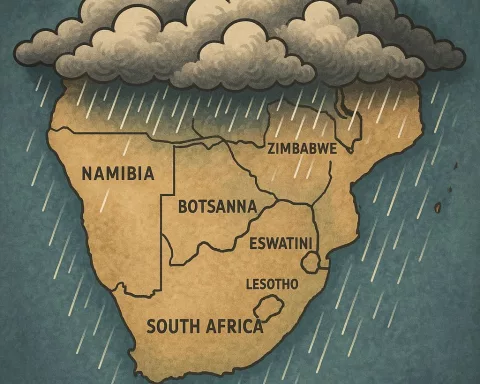South Africa has taken a bold step towards tackling climate change with the recent signing of the Climate Change Bill into law by President Cyril Ramaphosa. The law provides a structured approach to South Africa’s response to climate change, addressing urgent issues such as governance, climate change mitigation strategies, and the potentially catastrophic effects on agriculture and food supplies. This legislation sets a precedent for South Africa’s regional partners and the international community, highlighting the importance of collective action in the face of a global environmental crisis.
South Africa Takes a Definitive Step
Recent legislation signed into law by President Cyril Ramaphosa signifies a unified front against climate change in South Africa. This monumental achievement involves the implementation of the Climate Change Bill, a law designed to provide a structured approach to countries’ battles against climate change. The law tackles a number of urgent issues that have perplexed governments worldwide, such as governance and climate change mitigation strategies.
South Africa Takes a Definitive Step
In a groundbreaking move, recent legislation signed into law by President Cyril Ramaphosa signifies a unified front against climate change in South Africa. This monumental achievement involves the implementation of the Climate Change Bill, a law designed to provide a structured approach to countries’ battles against climate change. Chairperson of the Portfolio Committee on Forestry, Fisheries, and the Environment, Ms. Nqabisa Gantsho, threw her full support behind this legislative milestone.
Key Aspects of the Climate Change Bill
The Climate Change Bill tackles a number of urgent issues that have perplexed governments worldwide, such as governance and climate change mitigation strategies. The law is primarily concerned with creating climate resilience strategies and enabling South Africans to access climate information. The potentially catastrophic effect of climate change on agriculture and food supplies is also addressed by the law.
Moreover, the law draws attention to the discretionary authority of the Presidential Commission on Climate Change, and delves into the hotly contested issues of carbon tax and carbon budgets. The legislation also illuminates the role that the Basic Education sector plays in the climate change discussion, underlining the importance of a fundamental, grassroots understanding of the issue.
The Significance of the Legislation
Ms Gantsho asserts that this new legislation aligns perfectly with the Just Transition Framework’s adaptation and mitigation strategies, thus amplifying South Africa’s response to climate change.
“The President’s decision to enact the Climate Change Bill is proof of South Africa’s resolve and dedication to reducing climate impact within its own territory and throughout the region,” Ms Gantsho declared. “Our committee worked tirelessly to bring this legislation to fruition. We hope our neighbours will see this as a standard to aspire to and will strive to emulate our efforts.”
Further emphasizing the importance of a unified stance in the battle against climate change, Ms Gantsho stressed that such cohesion must extend beyond municipalities and provinces to national and even international boundaries, including neighbouring countries. She contends that the Climate Change Bill provides a solid framework to facilitate this unity.
“We remain resolute in our commitment to adaptation and mitigation strategies. We recognize the harsh truth of global warming, with average temperature increases of 1.5 degrees and rising,” Ms Gantsho affirmed. “However, we are determined in our struggle, and we will triumph.”
The Future of Climate Change Mitigation in South Africa
Ms Gantsho strongly urged the National Treasury and the Department of Forestry, Fisheries, and the Environment to expedite the creation of the Climate Change Response Fund. This Fund, integral to the new law, bolsters South Africa’s ability to confront impending climate emergencies.
In her concluding remarks, Ms Gantsho encouraged committee members to collaborate effectively, stressing that teamwork is essential in addressing the environmental problems currently confronting South Africans. This legislation represents a significant turning point in South Africa’s campaign to manage climate change, setting a precedent for its regional partners and the international community. The Climate Change Bill truly symbolizes a ray of hope, an urgent call for collective action in the face of a worldwide environmental crisis.
What is the Climate Change Bill in South Africa?
The Climate Change Bill is a recent legislation signed into law by President Cyril Ramaphosa that aims to provide a structured approach to South Africa’s response to climate change. It addresses urgent issues such as governance, climate change mitigation strategies, and the potentially catastrophic effects on agriculture and food supplies.
What are the key aspects of the Climate Change Bill?
The Climate Change Bill primarily focuses on creating climate resilience strategies and enabling South Africans to access climate information. It also addresses the potentially catastrophic effect of climate change on agriculture and food supplies. The law draws attention to the discretionary authority of the Presidential Commission on Climate Change, and delves into the hotly contested issues of carbon tax and carbon budgets. The legislation also highlights the role that the Basic Education sector plays in the climate change discussion.
Why is the Climate Change Bill significant?
The Climate Change Bill signifies a unified front against climate change in South Africa. This monumental achievement involves the implementation of a law designed to provide a structured approach to countries’ battles against climate change. It sets a precedent for South Africa’s regional partners and the international community, highlighting the importance of collective action in the face of a global environmental crisis.
How does the Climate Change Bill align with the Just Transition Framework?
The Climate Change Bill aligns perfectly with the Just Transition Framework’s adaptation and mitigation strategies, amplifying South Africa’s response to climate change. It provides a solid framework to facilitate unity in the battle against climate change.
What is the Climate Change Response Fund?
The Climate Change Response Fund is integral to the new law and strengthens South Africa’s ability to confront impending climate emergencies. Ms Gantsho strongly urged the National Treasury and the Department of Forestry, Fisheries, and the Environment to expedite the creation of this fund.
How can teamwork help in addressing environmental problems in South Africa?
Ms Gantsho stressed that teamwork is essential in addressing the environmental problems currently confronting South Africans. Effective collaboration among committee members is crucial in addressing environmental problems and managing climate change.












